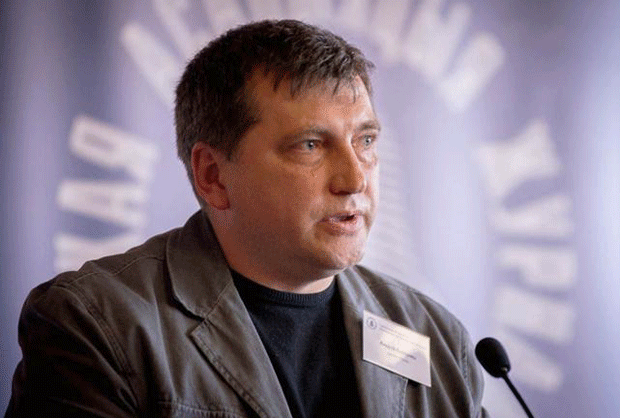It is hard to imagine something more damning as an indicator of press freedom than a leader banning the country’s journalism union and threatening penalties and jail for anyone who has dealings with it.
Yet this is what has been done by Alyaksandr Lukashenka’s Belarus, fast becoming a model for media repression. In February, the Belarusian Association of Journalists (BAJ) was designated by the authorities in the country as an “extremist formation”.
The authorities also identified eight people, including BAJ chair Andrey Bastunets, who now face up to ten years in prison for “establishing or participating” in the organisation. Others who have financed or “abetted” BAJ could also face jail time, arbitrary detentions, interrogations, and searches.
While another 20 media companies, most of the mainstream, independent Belarusian media, have also been given a similar label, this is the first human rights organisation to be designated thus.
Now the Belarusian authorities have gone a step further and BAJ’s website, social media accounts and logo have now been designated as “extremist materials”. Anyone disseminating the association’s content or merely liking an article on its social feeds could mean a 15 day stay in jail.
The situation is like Britain’s government putting the National Union of Journalists in the same category as Al Qaeda.
Journalists in Belarus, at least those who report critically about Lukashenka’s activities, are now under threat. Some are in jail – 34 media workers at the end of June) – despite Lukashenka this week telling the BBC’s Steve Rosenberg that there are no political prisoners in the country.
Other journalists have left the profession while others have fled abroad.
In spite of these attacks, Bastunets, speaking to Index about the challenges facing journalists, says the independent media of Belarus is far from dead.
“Those journalists who left the country face different challenges than their colleagues in Belarus,” he says, with particular problems in obtaining legal residency in host countries, the high cost of living and renting accommodation even though many of them have their own, now empty, apartments in Belarus.
“There is also the different legal environment, language problems, the sometimes discriminatory attitude to Belarusians as co-aggressors, …and, for some, psychological burn-out.”
Many of those who left Belarus expected to return in a month or two, he says.
“Repression has been going on for almost three years and it is not clear when it might stop. And if media outlets have mostly coped with relocation, survival, and the arrangement of their activities, new challenges await us if current trends persist. One of them is the necessity of accepting the fact that we are in exile for a long time.”
But rumours about the death of the independent media in Belarus are “exaggerated”, he says.
“Several influential media outlets are still working in the country. But, of course, their working conditions are extremely unfavourable. Journalists live under constant threat of raids, detentions, interrogations, and criminal prosecution.”
As a result, media organisations that still operate in Belarus have reinforced safety measures for their journalists as well as using even more secure communications protocols.
They are also self-censoring to some extent.
“Editorial boards have to take extra care when publishing pierces on sensitive issues – on government activities, on opposition, on the war in Ukraine, etc. – in order to minimise the risks,” says Bastunets.
In addition to media outlets with editorial offices in Belarus, there is also a large number of freelance journalists who continue to operate in the country but contribute, usually anonymously, to editors in exile.
This carries grave risks. On 30 June, cameraman Pavel Padabed was sentenced to four years in prison after being accused of cooperation with the Polish TV channel Belsat, which has also been recognised as an extremist formation.
There is plenty to report on.
The news two weekends ago that Alyaksandr Lukashenka, whose legitimacy as the leader of Belarus is contested, had acted as a “peacemaker” between Vladimir Putin and Yevgeny Prigozhin provided an interesting story for Belarusian media, both in and outside the country.
Lukashenka promised Prigozhin that could come to Belarus as part of a deal he claimed to have brokered to reduce the tension. Confusingly, he has since announced that Prigozhin is not in Belarus but in St Petersburg (or Moscow).
Most independent media actively covered the actions of Prigozhin and Wagner against the Russian Defence Ministry, with editors and commentators using a variety of terms – military uprising, putsch, coup attempt, march of justice, conflict – to describe it.
“State-run media outlets focused on ‘praising’ Lukashenka’s role in settlement of the conflict, which is questioned by many independent experts,” says Bastunets. “It is unknown whether Prigozhin and Wagner Group mercenaries are now in Belarus and whether they were or will be here at all. But there is a feeling that the Wagner mercenaries will not be welcome guests.”
If Prigozhin does turn out to be in Belarus, the country’s independent media are still there to report on it.





